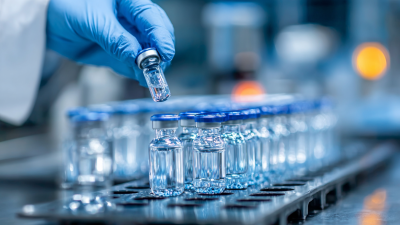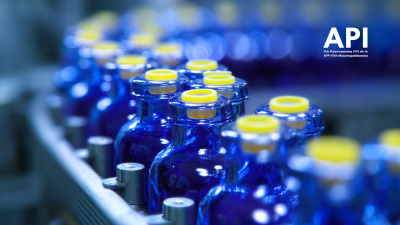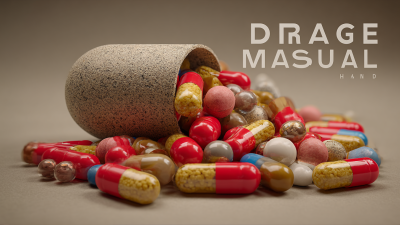
10 Best Practices for Peptide API Manufacturing to Maximize Efficiency
Peptide API manufacturing has become increasingly vital in the pharmaceutical industry, with the global peptide therapeutics market projected to reach approximately $53 billion by 2025, according to a report by Grand View Research. As this sector expands, the need for optimized manufacturing processes becomes imperative to enhance productivity and reduce costs. Best practices in peptide API manufacturing not only contribute to higher yield and purity but also ensure compliance with stringent regulatory standards. By implementing innovative techniques and leveraging advanced technologies, manufacturers can significantly streamline their operations, thereby maximizing efficiency. This blog will explore the ten best practices for peptide API manufacturing to help industry players navigate the complexities of this specialized field and improve their production frameworks.

Understanding Peptide APIs: Definitions and Importance in Pharmaceuticals
Peptide Active Pharmaceutical Ingredients (APIs) are crucial components in the development of modern therapeutics. Composed of short chains of amino acids, peptides play a significant role in various biological processes and have been leveraged for their high specificity and potency in treating a wide range of diseases, including cancer, diabetes, and autoimmune disorders. Their unique structures allow for targeted interactions with biological receptors, making them invaluable in pharmaceutical formulations where precision and efficacy are paramount.
The importance of peptide APIs in the pharmaceutical industry can be attributed to their ability to mimic natural biological functions, enhancing the therapeutic outcomes. Additionally, the ongoing advancements in peptide synthesis and design have expanded the possibilities for novel drug development. As researchers continue to explore the potential of peptides, understanding their properties, mechanisms, and the latest manufacturing practices becomes essential for maximizing efficiency and ensuring high-quality production. This alignment will not only improve medication efficacy but also contribute to the overall advancement of healthcare solutions.
Key Challenges in Peptide API Manufacturing and How to Overcome Them
Peptide API manufacturing presents unique challenges that can hinder efficiency and output quality. One of the primary obstacles is the complexity of the synthesis process, which often requires precise conditions and reagents. Improper scaling of reactions may lead to incomplete yields or product degradation. To overcome this, manufacturers should invest in robust validation processes and utilize advanced analytics to monitor reaction parameters in real-time. This proactive approach can significantly reduce trial-and-error phases, ensuring more consistent and high-quality peptide production.
Another challenge lies in the purification and isolation of peptides, which can be time-consuming and resource-intensive. Traditional methods may not always yield the desired purity levels, potentially affecting the therapeutic efficacy of the final product. Implementing innovative purification technologies, such as high-performance liquid chromatography (HPLC) and membrane filtration, can enhance efficiency. Additionally, adopting continuous processing techniques may help streamline operations, allowing for quicker turnaround times from synthesis to final product, ultimately maximizing production capacity while maintaining stringent quality standards.
Essential Equipment and Technologies for Efficient Peptide Production
Efficient peptide production relies heavily on advanced equipment and technologies that enhance synthesis processes and optimize yield. The recent report indicates that the peptide synthesis market is projected to grow at an impressive CAGR of 8.1%, reaching approximately USD 1312.4 million by 2033. This growth can be attributed to the rising demand for peptide-based therapeutics, driven by their efficacy in treating various conditions.
One tip for maximizing efficiency in peptide API manufacturing is to incorporate high-throughput synthesis platforms, which allow for rapid and parallel production of peptides. This technology not only accelerates the discovery phase but also leads to significant cost savings. Furthermore, implementing accurate monitoring systems, particularly for protease activity, can enhance hydrolysis efficiency and minimize nonspecific proteolysis, ensuring consistent yields.
Adopting green chemistry principles is another best practice for optimizing peptide synthesis. By utilizing environmentally friendly reagents and processes, manufacturers can reduce waste and improve sustainability. Such methodologies not only align with industry standards but also appeal to a growing consumer base that prioritizes environmentally responsible products.

Quality Control Measures to Ensure High Standards in Peptide APIs
Quality control is paramount in peptide API manufacturing, as it directly impacts product efficacy and patient safety. To ensure high standards, manufacturers should implement robust testing protocols at various stages of the production process. This includes rigorous analysis of raw materials before synthesis, where interpretable characteristics such as purity and concentration are assessed. Employing advanced analytical techniques like high-performance liquid chromatography (HPLC) and mass spectrometry can help identify impurities or degradation products, ensuring only high-quality inputs are utilized in the manufacturing process.
In addition to stringent testing of materials, continuous monitoring during the synthesis phase is crucial. This can be facilitated through in-process quality control measures that track parameters such as reaction temperature, pH, and time. By adopting real-time monitoring technologies, manufacturers can promptly identify deviations from established norms and take corrective actions, thereby minimizing batch failures. Final product validation also plays a significant role in quality assurance; conducting stability studies under various conditions helps ensure that peptide APIs maintain their integrity over time. Implementing these quality control measures not only enhances efficiency but also builds trust with regulatory bodies and end-users.
10 Best Practices for Peptide API Manufacturing
This bar chart illustrates the key practices in peptide API manufacturing that can enhance efficiency and ensure high standards through effective quality control measures.
Streamlining Processes: Automation Trends in Peptide Manufacturing
As automation continues to revolutionize peptide manufacturing, embracing modern technology trends has become essential for organizations aiming to maximize efficiency. The integration of 5G technology is anticipated to facilitate faster and more reliable communication between equipment and systems, enhancing real-time monitoring and control of manufacturing processes. This connectivity not only improves operational efficiency but also aids in predictive maintenance, significantly reducing downtime.
Machine learning is another trend reshaping the landscape of peptide API manufacturing. By leveraging data analytics, manufacturers can optimize their production processes and make informed decisions that drive continuous improvement. Machine learning algorithms can identify patterns and anomalies, allowing for more precise adjustments and reducing the likelihood of errors. This innovation paves the way for higher yields and reduced costs.
To fully harness the potential of automation, it is vital to invest in employee training and develop a culture that embraces technological advancements. Encouraging teams to engage with emerging tools and processes fosters an environment where creativity flourishes. As organizations adopt these practices, they will not only streamline their operations but also position themselves for success in the rapidly evolving peptide manufacturing market.

Related Posts
-

Ultimate Guide to Sourcing the Best Peptide Api Manufacturing for Your Business Needs
-

Maximizing ROI: The After-Sales Service Edge in Best Peptide API Manufacturing
-

7 Best Practices for Efficient Peptide API Manufacturing You Must Know
-

2025 Global Market Insights: 7 Essential Tips for Sourcing Pharmaceutical Products Effectively
-

How to Choose the Best Drug Capsule Material for Your Pharmaceutical Needs
-

5 Reasons Why Our Drug Capsule Material Stands Out in the Global Market
